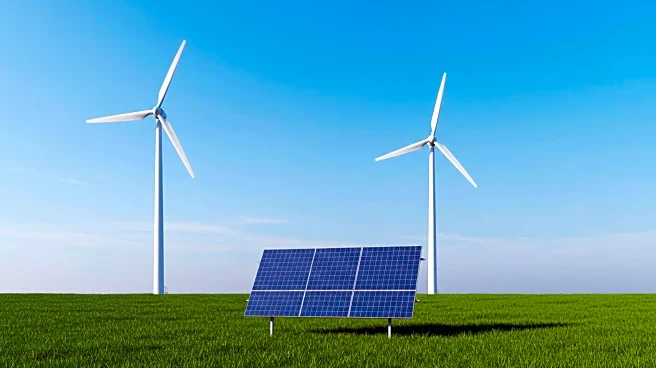What's Happening?
The renewable energy sector in the United States is facing a significant workforce shortage that threatens to impede its growth. This shortage spans both white-collar and blue-collar positions, affecting the development and maintenance of wind and solar energy projects. According to a report by McKinsey & Company, the expected quadrupling of global wind and solar capacity between 2011 and 2030 will be challenging to staff with qualified personnel. The shortage is exacerbated by a lack of awareness about career paths in clean energy and the departure of experienced professionals to other industries. Despite low costs driving growth, the sector faces challenges such as competition for land, volatile supply chains, and complex permitting processes.
Why It's Important?
The workforce shortage in the renewable energy sector is critical as it could hinder the United States' ability to transition to cleaner energy sources. This transition is essential for reducing carbon emissions and combating climate change. The shortage impacts the industry's capacity to meet growing energy demands and could slow down the deployment of new technologies. The lack of skilled workers may also affect the economic benefits associated with renewable energy, such as job creation and energy independence. Addressing this shortage is vital for sustaining the sector's growth and ensuring the U.S. remains competitive in the global clean energy market.
What's Next?
To address the workforce shortage, industry insiders suggest several strategies, including building partnerships with educational institutions, creating apprenticeship pathways, updating credential requirements, and rethinking recruitment strategies. These approaches aim to create a pipeline of skilled workers for the renewable energy sector. Additionally, targeting strategic alliances with community colleges and sponsoring programs can help attract new talent. While these solutions won't resolve the talent gap overnight, they are crucial steps toward mitigating the issue and supporting the clean energy transition.
Beyond the Headlines
The workforce shortage in renewable energy also highlights broader issues such as the need for educational reform and increased awareness of career opportunities in emerging industries. It underscores the importance of aligning educational programs with industry needs to prepare the next generation of workers. Furthermore, the shortage reflects the challenges of transitioning to a sustainable economy, where traditional industries may compete for talent with new sectors. Addressing these challenges requires a coordinated effort from policymakers, educators, and industry leaders.











